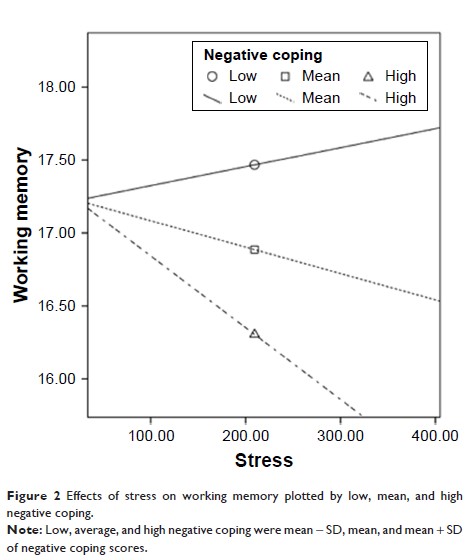108384
论文已发表
注册即可获取德孚的最新动态
IF 收录期刊
- 3.4 Breast Cancer (Dove Med Press)
- 3.2 Clin Epidemiol
- 2.6 Cancer Manag Res
- 2.9 Infect Drug Resist
- 3.7 Clin Interv Aging
- 5.1 Drug Des Dev Ther
- 3.1 Int J Chronic Obstr
- 6.6 Int J Nanomed
- 2.6 Int J Women's Health
- 2.9 Neuropsych Dis Treat
- 2.8 OncoTargets Ther
- 2.0 Patient Prefer Adher
- 2.2 Ther Clin Risk Manag
- 2.5 J Pain Res
- 3.0 Diabet Metab Synd Ob
- 3.2 Psychol Res Behav Ma
- 3.4 Nat Sci Sleep
- 1.8 Pharmgenomics Pers Med
- 2.0 Risk Manag Healthc Policy
- 4.1 J Inflamm Res
- 2.0 Int J Gen Med
- 3.4 J Hepatocell Carcinoma
- 3.0 J Asthma Allergy
- 2.2 Clin Cosmet Investig Dermatol
- 2.4 J Multidiscip Healthc

压力和应对方式对精神分裂症患者认知功能的交互影响
Authors Zhu X, Xu X, Xu C, Zhang J, Zhang X, Ma L, Liu J, Wang K
Received 25 July 2018
Accepted for publication 4 December 2018
Published 21 February 2019 Volume 2019:15 Pages 523—530
DOI https://doi.org/10.2147/NDT.S181471
Checked for plagiarism Yes
Review by Single-blind
Peer reviewers approved by Dr Cristina Weinberg
Peer reviewer comments 3
Editor who approved publication: Dr Yu-Ping Ning
Purpose: Previous
studies have not determined the interactive effects of stress and coping style
on cognitive function in patients with schizophrenia, and the current studies
have been restricted to the relationship between stress and stress response,
which may be associated with cognitive impairment in individuals with
schizophrenia. The present research was aimed to determine whether stress is
related to cognitive function in patients with schizophrenia. In addition, this
research further investigates the moderating effects of coping style on the
relationship between stress and cognitive function in patients with
schizophrenia on the basis of stress and coping theory.
Patients and methods: Our
sample consisted of 274 patients with a confirmed diagnosis of schizophrenia,
and all of them completed the Simple Cope Style Questionnaire, Social
Readjustment Rating Scale, and cognitive function assessment. A multivariate
regression analysis was performed to investigate the possible correlations
between cognitive function and stress, and the moderating effects of coping
style on the relationship between stress and cognitive function were tested
using the PROCESS macro for SPSS.
Results: Stress
was negatively correlated with working memory. Negative coping but not positive
coping moderated the relationship between stress and working memory in patients
with schizophrenia, and the Johnson–Neyman technique showed that the moderating
effect was significant only above this cutoff (38.32% of all negative coping
scores). This means that when exposed to similar stress, patients adopting high
negative coping had worse working memory than those who did not.
Conclusion: These
findings suggested that the assessment of stress and coping style may help
estimate working memory impairment risk in patients with schizophrenia, and
reducing negative coping may be a crucial intervention target to prevent
further impairment of working memory in patients with schizophrenia suffering
from great stress.
Keywords: cognitive function, life
events, negative coping, positive coping
